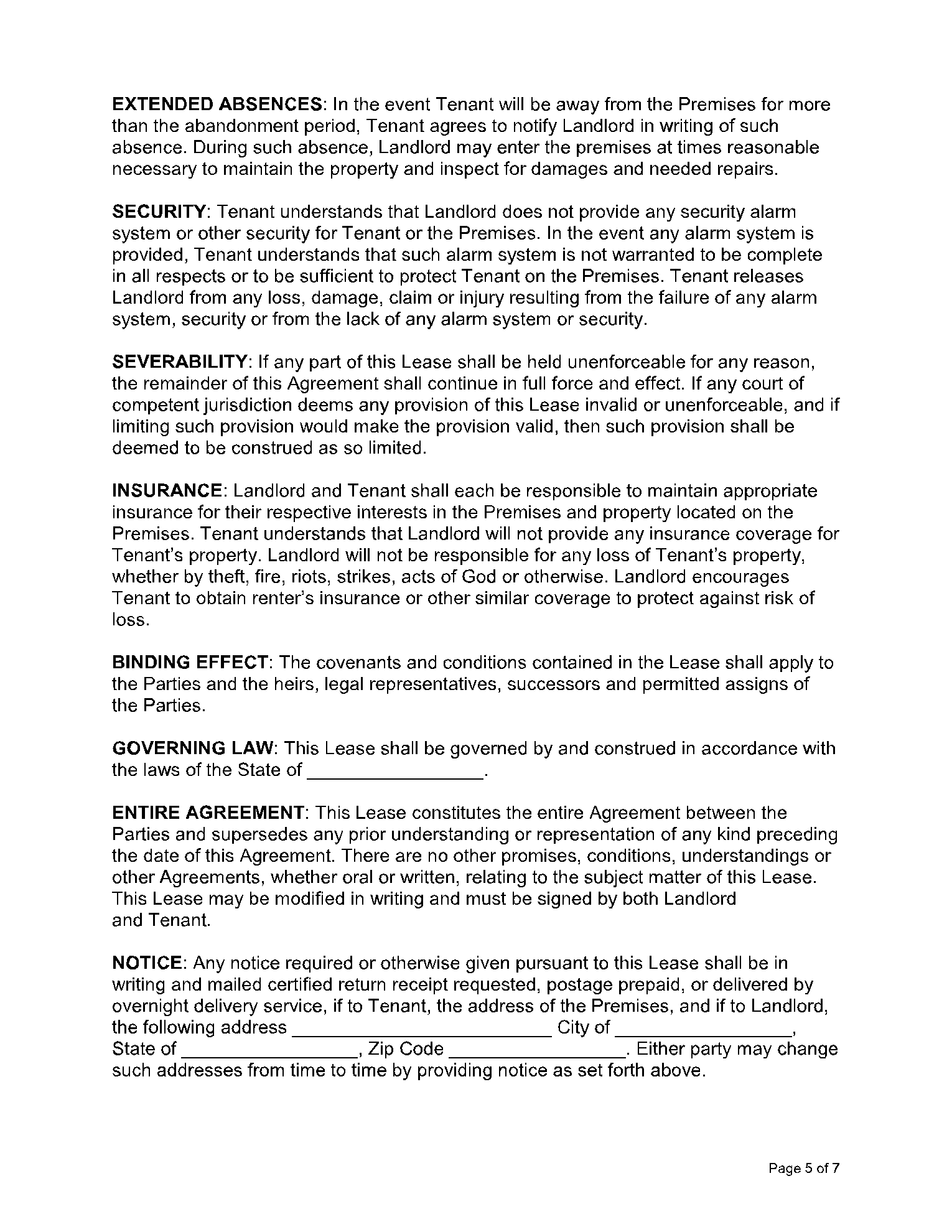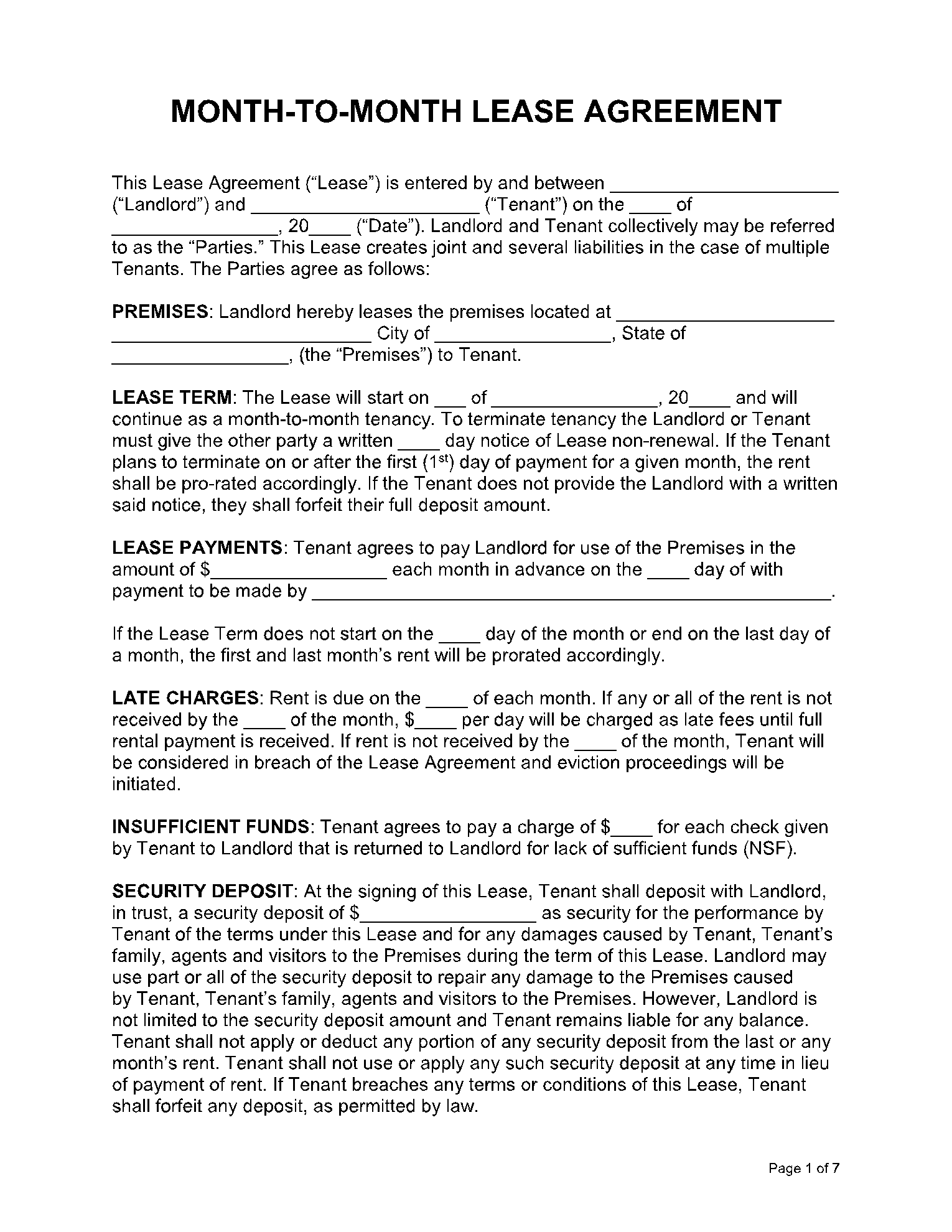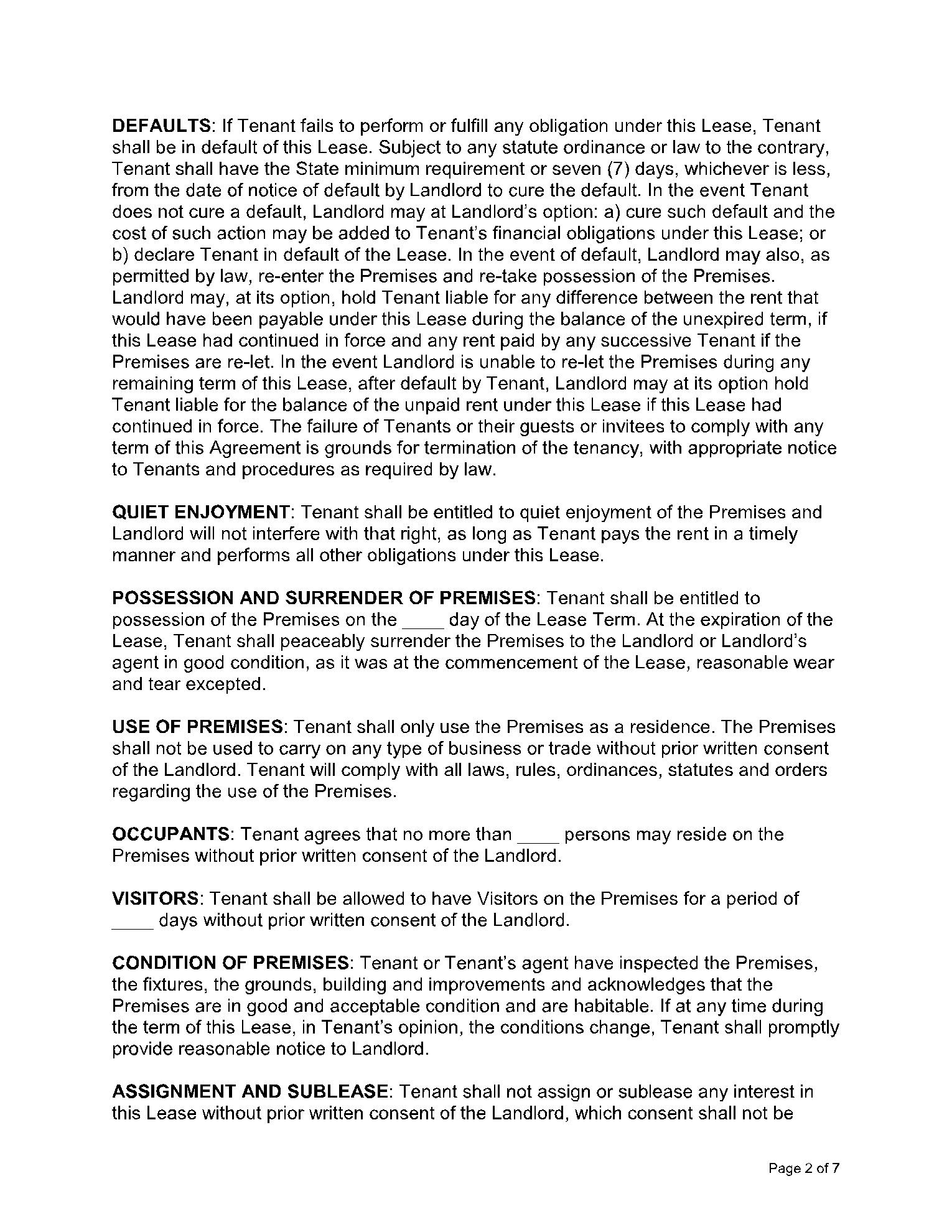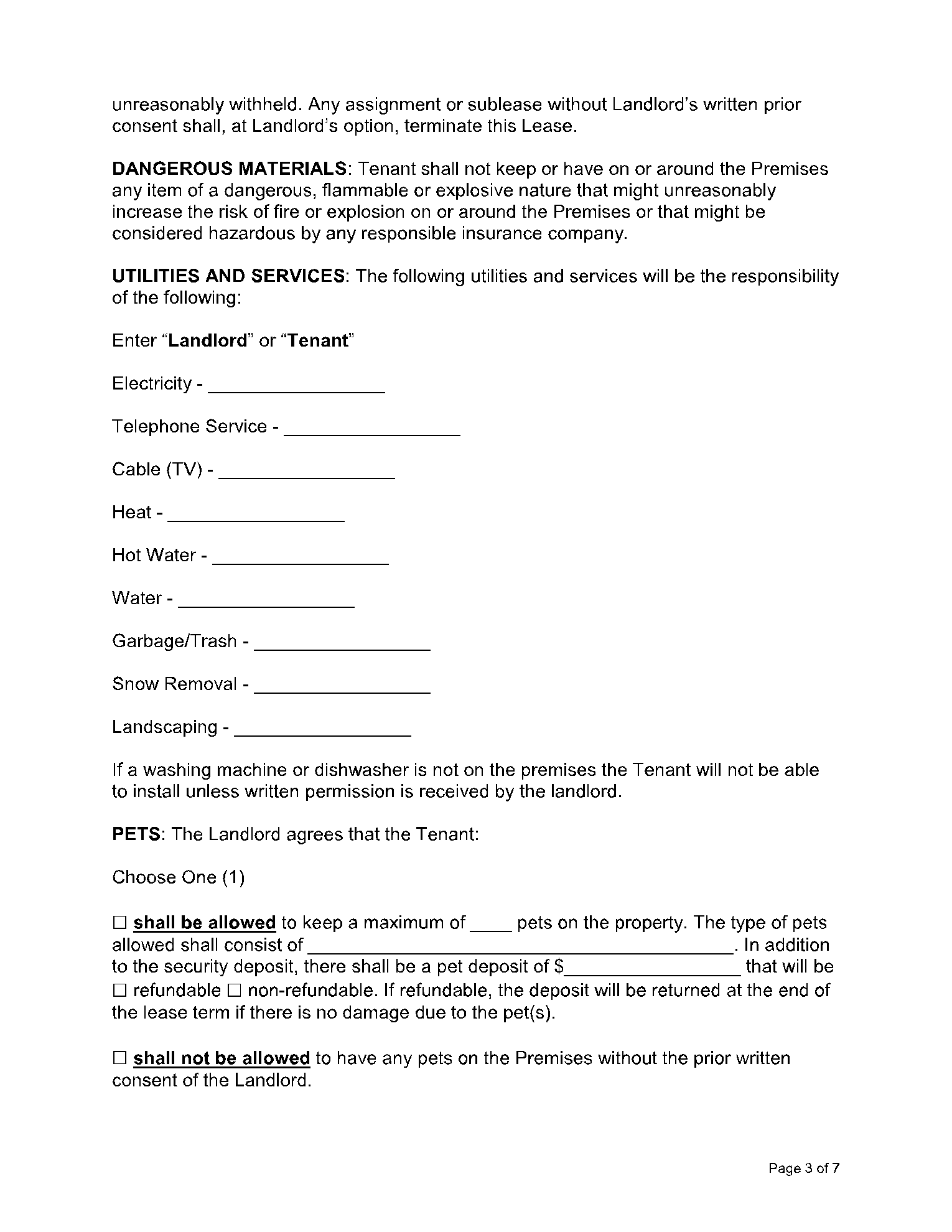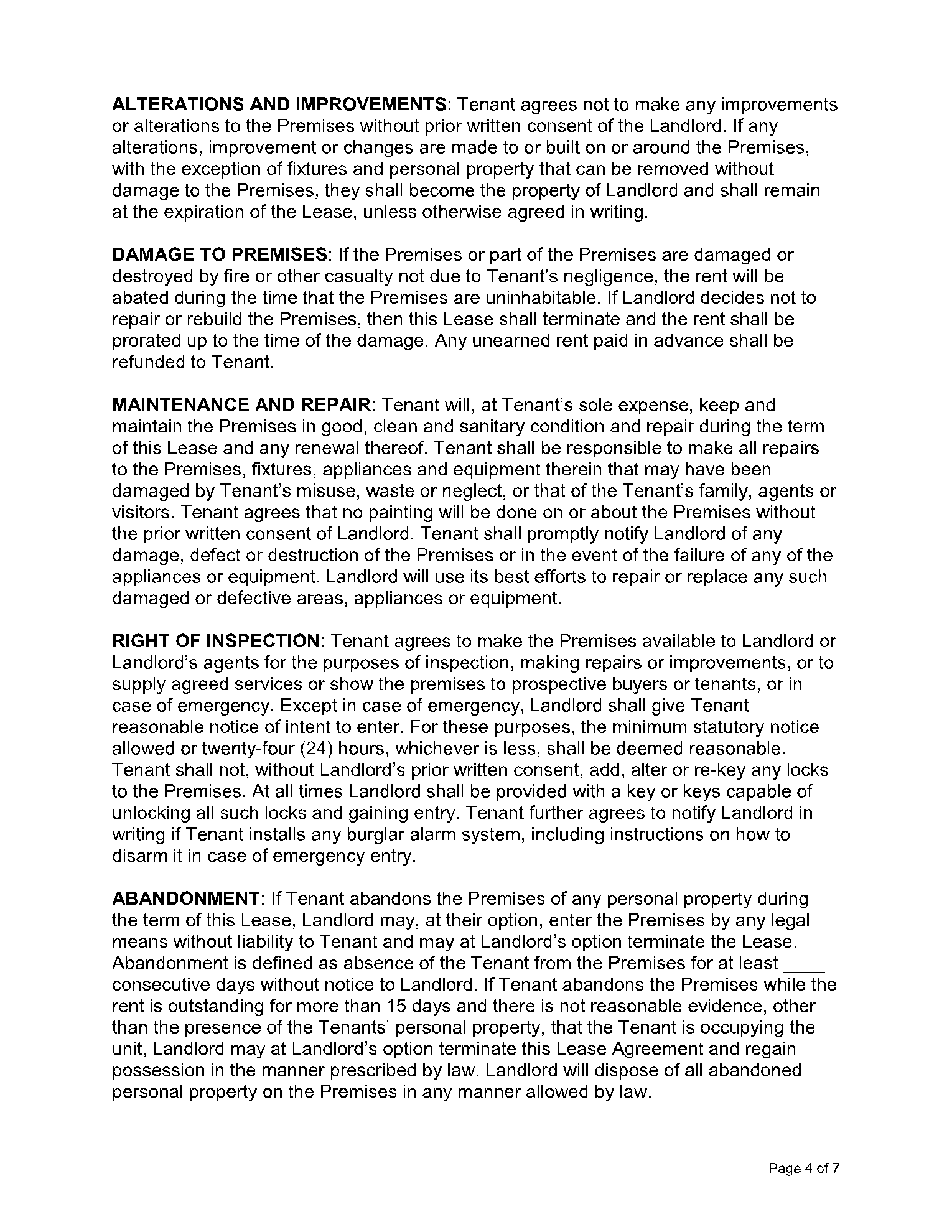A month-to-month lease agreement is needed by a tenant or a landlord to protect their rights and interests during a lease period of a property. The benefit of these contracts is that they can be canceled by either party at will, following the notice period procedure.
Creating a month-to-month lease agreement requires the proper lease agreement template. CocoSign offers you month-to-month lease agreement templates in a proper format, created by legal experts.
Read below to find out more about month-to-month lease agreements:
What Is a Month-to-Month Lease Agreement?
A month-to-month lease agreement is a legally binding document that outlines the terms of leasing a residential property between the property owner and another party.
A month-to-month lease agreement is quite different from a long-term lease agreement, in the view that the latter allows tenancy for longer periods of time (usually a year). However, in a month-to-month lease agreement, the renter leases the property on a per month basis.
A major component of a month-to-month lease agreement is the cancellation policy. Either party involved in a month-to-month lease agreement can cancel the agreement at will, after giving a notice period of 30 days or 60 days (depending on State Laws).
The month-to-month lease agreement is perpetual until either party wishes to end it. The property owner in a month-to-month lease agreement has the option to increase the rent (with the rent increase conforming to State Laws).
However, they need to provide the renter with an adequate notice period, after which the renter has the option to pay the increased rent or vacate the property.
Download Our Month-to-Month Lease Agreement Template
Get the hassle-free month-to-month lease agreement now! It comes in useful whenever you don’t want to have your rent tied down for a big duration of almost a year.
How Does a Month-to-Month Lease Work?
A month-to-month lease agreement is similar to a standard lease agreement in terms of fulfilling one’s responsibilities, moving-in, eviction, and following the housing laws.
The major difference is the ability to cancel the agreement at will with an adequate notice period that adheres to the State Laws. further, the ability to cancel the lease agreement is provided to both- the landlord and the tenant.
The notice period can be agreed upon by the property owner and the renter. However, it needs to obey the minimum notice period requirement of the State in which the property is present.
When Should You Use a Month-to-Month Lease Agreement?
There can be confusion regarding whether to use a month-to-month lease agreement or a long-term lease agreement. Here are the cases in which a month-to-month lease agreement should be used preferably:
Month-to-Month Lease Agreement For Landlords:
A month-to-month lease agreement is a good option for landlords who wish to enter into a trial period with a tenant, before going ahead with a long-term lease.
If the landlord is unfamiliar with the tenant, a month-to-month lease agreement allows them to terminate their relationship with the tenant after providing the appropriate notice period.
Further, a month-to-month lease agreement also gives a landlord greater freedom to increase the rent on the property. This allows the landlord to adapt to the rapidly changing housing trends.
Month-to-Month Lease Agreement for Tenants:
Living in the same housing place can be frustrating for some tenants. For such tenants, a month-to-month lease agreement provides the flexibility to change their location at will (after following the notice period process).
Further, if a renter wishes to try out a property before renting it for the long term, a month-to-month lease agreement can turn out to be the perfect fit in such a case.
For transient workers who might have to leave town after a short period of time (generally a few months), a month-to-month lease agreement can be the perfect fit.
Advantages and Disadvantages of a Month-to-Month Lease Agreement
Advantages of a month-to-month lease agreement:
- A month-to-month lease agreement has several advantages for the renter and the landlord, some of which are mentioned above.
- This type of lease agreement provides the renter and the property owner with greater housing freedom. Either party can end the lease agreement at will, so neither is constrained by having to go through the entire lease duration even when they do not wish to.
- Furthermore, it gives financial freedom to the landlord as they can increase the property rent according to the changing housing trends in that locality.
- For the renter, it gives them the option to try out a property before leasing it for the long term. If they do not like the property, they have the option to move to new housing.
Disadvantages of a month-to-month lease agreement:
- Leasing a new property is a time and effort-consuming process, both for the renter and the property owner. Since the month-to-month lease agreement allows either party to cancel the lease, it can leave the other party spending all the time and effort again for a new lease, even if they do not wish to.
- At times, renters can see the month-to-month lease agreements as being unfair since they provide the landlord with the ability to increase the rent on a regular basis, after providing the renter with a notice period. The renter only has the option to pay the rent or vacate.
- For the landlord, the notice period of 30 days or more can lead to the requirement of following the same eviction process as a long-term lease, along with the risk of unpaid rent.
Components of a Month-to-Month Lease Agreement
The month-to-month lease agreements generally include:
Identification of Landlord and Tenant
The lease agreement should identify the parties in the agreement, i.e. the landlord and the tenant. If there is more than one tenant, the lease agreement should list each of them.
Identification of the Premises
The location of the property that is being leased should be mentioned in the lease agreement.
Rent
The lease agreement should also mention the monthly rent that will be paid by the renter to the property owner.
Guarantor
In case the renter does not meet the minimum income requirement or the credit score, the lease agreement may have a Guarantor who agrees to bear any unpaid rent in case the renter fails to pay it.
Security Deposits
In case there are any refundable or non-refundable deposits on the premises, the lease agreement should mention so.
Eviction Process
The lease agreement should detail the eviction process, including the notice period that has been agreed upon by both parties. The notice period should meet the minimum guidelines that are set by the laws of the State in which the property is present.
Download Our Month-to-Month Lease Agreement Template
Get the hassle-free month-to-month lease agreement now! It comes in useful whenever you don’t want to have your rent tied down for a big duration of almost a year.
Endnotes
A month-to-month lease agreement is a legally binding document, which means that it needs to be written well. Therefore, the best way to go ahead with these contracts is to download the month-to-month lease agreement template from CocoSign.
CocoSign offers a variety of contract templates suited for the particular needs of either party involved. The templates are created by legal experts so as to make them legally binding. Further, they can be edited and tailored to meet your needs.
Download the month-to-month lease agreement template from CocoSign right away!
DOCUMENT PREVIEW
MONTH-TO-MONTH LEASE AGREEMENT
This Lease Agreement (“Lease” ) is entered by and between ______________________ (“Landlord” ) and ______________________ (“Tenant” ) on the ____ of ________________, 20____ (“Date” ). Landlord and Tenant collectively may be referred to as the “Parties.” This Lease creates joint and several liabilities in the case of multiple Tenants. The Parties agree as follows:
PREMISES: Landlord hereby leases the premises located at _____________________ _________________________ City of _________________, State of _________________, (the “Premises” ) to Tenant.
LEASE TERM: The Lease will start on of 20 and will
continue as a month-to-month tenancy. To terminate tenancy the Landlord or Tenant must give the other party a written ____ day notice of Lease non-renewal. If the Tenant plans to terminate on or after the first (1st) day of payment for a given month, the rent shall be pro-rated accordingly. If the Tenant does not provide the Landlord with a written said notice, they shall forfeit their full deposit amount.
LEASE PAYMENTS: Tenant agrees to pay Landlord for use of the Premises in the amount of $_________________ each month in advance on the ____ day of with payment to be made by __________________________________________________.
If the Lease Term does not start on the ____ day of the month or end on the last day of a month, the first and last month’s rent will be prorated accordingly.
LATE CHARGES: Rent is due on the ____ of each month. If any or all of the rent is not received by the ____ of the month, $____ per day will be charged as late fees until full rental payment is received. If rent is not received by the ____ of the month, Tenant will be considered in breach of the Lease Agreement and eviction proceedings will be initiated.
INSUFFICIENT FUNDS: Tenant agrees to pay a charge of $____ for each check given by Tenant to Landlord that is returned to Landlord for lack of sufficient funds (NSF).
SECURITY DEPOSIT: At the signing of this Lease, Tenant shall deposit with Landlord, in trust, a security deposit of $_________________ as security for the performance by Tenant of the terms under this Lease and for any damages caused by Tenant, Tenant’s family, agents and visitors to the Premises during the term of this Lease. Landlord may use part or all of the security deposit to repair any damage to the Premises caused by Tenant, Tenant’s family, agents and visitors to the Premises. However, Landlord is not limited to the security deposit amount and Tenant remains liable for any balance. Tenant shall not apply or deduct any portion of any security deposit from the last or any month’s rent. Tenant shall not use or apply any such security deposit at any time in lieu
DEFAULTS: If Tenant fails to perform or fulfill any obligation under this Lease, Tenant shall be in default of this Lease. Subject to any statute ordinance or law to the contrary, Tenant shall have the State minimum requirement or seven (7) days, whichever is less, from the date of notice of default by Landlord to cure the default. In the event Tenant does not cure a default, Landlord may at Landlord’s option: a) cure such default and the cost of such action may be added to Tenant’s financial obligations under this Lease; or b) declare Tenant in default of the Lease. In the event of default, Landlord may also, as permitted by law, re-enter the Premises and re-take possession of the Premises. Landlord may, at its option, hold Tenant liable for any difference between the rent that would have been payable under this Lease during the balance of the unexpired term, if this Lease had continued in force and any rent paid by any successive Tenant if the Premises are re-let. In the event Landlord is unable to re-let the Premises during any remaining term of this Lease, after default by Tenant, Landlord may at its option hold Tenant liable for the balance of the unpaid rent under this Lease if this Lease had continued in force. The failure of Tenants or their guests or invitees to comply with any term of this Agreement is grounds for termination of the tenancy, with appropriate notice to Tenants and procedures as required by law.
QUIET ENJOYMENT: Tenant shall be entitled to quiet enjoyment of the Premises and Landlord will not interfere with that right, as long as Tenant pays the rent in a timely manner and performs all other obligations under this Lease.
POSSESSION AND SURRENDER OF PREMISES: Tenant shall be entitled to possession of the Premises on the ____ day of the Lease Term. At the expiration of the Lease, Tenant shall peaceably surrender the Premises to the Landlord or Landlord’s agent in good condition, as it was at the commencement of the Lease, reasonable wear and tear excepted.
USE OF PREMISES: Tenant shall only use the Premises as a residence. The Premises shall not be used to carry on any type of business or trade without prior written consent of the Landlord. Tenant will comply with all laws, rules, ordinances, statutes and orders regarding the use of the Premises.
OCCUPANTS: Tenant agrees that no more than ____ persons may reside on the Premises without prior written consent of the Landlord.
VISITORS: Tenant shall be allowed to have Visitors on the Premises for a period of ____ days without prior written consent of the Landlord.
CONDITION OF PREMISES: Tenant or Tenant’s agent have inspected the Premises, the fixtures, the grounds, building and improvements and acknowledges that the Premises are in good and acceptable condition and are habitable. If at any time during the term of this Lease, in Tenant’s opinion, the conditions change, Tenant shall promptly provide reasonable notice to Landlord.
ASSIGNMENT AND SUBLEASE: Tenant shall not assign or sublease any interest in this Lease without prior written consent of the Landlord, which consent shall not be
unreasonably withheld. Any assignment or sublease without Landlord’s written prior consent shall, at Landlord’s option, terminate this Lease.
DANGEROUS MATERIALS: Tenant shall not keep or have on or around the Premises any item of a dangerous, flammable or explosive nature that might unreasonably increase the risk of fire or explosion on or around the Premises or that might be considered hazardous by any responsible insurance company.
UTILITIES AND SERVICES: The following utilities and services will be the responsibility of the following:
Enter “Landlord” or “Tenant”
Electricity - _________________
Telephone Service - _________________
Cable (TV) - _________________
Heat - _________________
Hot Water - _________________
Water - _________________
Garbage/Trash - _________________
Snow Removal - _________________
Landscaping - _________________
If a washing machine or dishwasher is not on the premises the Tenant will not be able to install unless written permission is received by the landlord.
PETS: The Landlord agrees that the Tenant:
Choose One (1)
☐ shall be allowed to keep a maximum of ____ pets on the property. The type of pets allowed shall consist of _________________________________________. In addition to the security deposit, there shall be a pet deposit of $_________________ that will be ☐ refundable ☐ non-refundable. If refundable, the deposit will be returned at the end of the lease term if there is no damage due to the pet(s).
☐ shall not be allowed to have any pets on the Premises without the prior written consent of the Landlord.
ALTERATIONS AND IMPROVEMENTS: Tenant agrees not to make any improvements or alterations to the Premises without prior written consent of the Landlord. If any alterations, improvement or changes are made to or built on or around the Premises, with the exception of fixtures and personal property that can be removed without damage to the Premises, they shall become the property of Landlord and shall remain at the expiration of the Lease, unless otherwise agreed in writing.
DAMAGE TO PREMISES: If the Premises or part of the Premises are damaged or destroyed by fire or other casualty not due to Tenant’s negligence, the rent will be abated during the time that the Premises are uninhabitable. If Landlord decides not to repair or rebuild the Premises, then this Lease shall terminate and the rent shall be prorated up to the time of the damage. Any unearned rent paid in advance shall be refunded to Tenant.
MAINTENANCE AND REPAIR: Tenant will, at Tenant’s sole expense, keep and maintain the Premises in good, clean and sanitary condition and repair during the term of this Lease and any renewal thereof. Tenant shall be responsible to make all repairs to the Premises, fixtures, appliances and equipment therein that may have been damaged by Tenant’s misuse, waste or neglect, or that of the Tenant’s family, agents or visitors. Tenant agrees that no painting will be done on or about the Premises without the prior written consent of Landlord. Tenant shall promptly notify Landlord of any damage, defect or destruction of the Premises or in the event of the failure of any of the appliances or equipment. Landlord will use its best efforts to repair or replace any such damaged or defective areas, appliances or equipment.
RIGHT OF INSPECTION: Tenant agrees to make the Premises available to Landlord or Landlord’s agents for the purposes of inspection, making repairs or improvements, or to supply agreed services or show the premises to prospective buyers or tenants, or in case of emergency. Except in case of emergency, Landlord shall give Tenant reasonable notice of intent to enter. For these purposes, the minimum statutory notice allowed or twenty-four (24) hours, whichever is less, shall be deemed reasonable. Tenant shall not, without Landlord’s prior written consent, add, alter or re-key any locks to the Premises. At all times Landlord shall be provided with a key or keys capable of unlocking all such locks and gaining entry. Tenant further agrees to notify Landlord in writing if Tenant installs any burglar alarm system, including instructions on how to disarm it in case of emergency entry.
ABANDONMENT: If Tenant abandons the Premises of any personal property during the term of this Lease, Landlord may, at their option, enter the Premises by any legal means without liability to Tenant and may at Landlord’s option terminate the Lease.
Abandonment is defined as absence of the Tenant from the Premises for at least
consecutive days without notice to Landlord. If Tenant abandons the Premises while the rent is outstanding for more than 15 days and there is not reasonable evidence, other than the presence of the Tenants’ personal property, that the Tenant is occupying the unit, Landlord may at Landlord’s option terminate this Lease Agreement and regain possession in the manner prescribed by law. Landlord will dispose of all abandoned personal property on the Premises in any manner allowed by law.
EXTENDED ABSENCES: In the event Tenant will be away from the Premises for more than the abandonment period, Tenant agrees to notify Landlord in writing of such absence. During such absence, Landlord may enter the premises at times reasonable necessary to maintain the property and inspect for damages and needed repairs.
SECURITY: Tenant understands that Landlord does not provide any security alarm system or other security for Tenant or the Premises. In the event any alarm system is provided, Tenant understands that such alarm system is not warranted to be complete in all respects or to be sufficient to protect Tenant on the Premises. Tenant releases Landlord from any loss, damage, claim or injury resulting from the failure of any alarm system, security or from the lack of any alarm system or security.
SEVERABILITY: If any part of this Lease shall be held unenforceable for any reason, the remainder of this Agreement shall continue in full force and effect. If any court of competent jurisdiction deems any provision of this Lease invalid or unenforceable, and if limiting such provision would make the provision valid, then such provision shall be deemed to be construed as so limited.
INSURANCE: Landlord and Tenant shall each be responsible to maintain appropriate insurance for their respective interests in the Premises and property located on the Premises. Tenant understands that Landlord will not provide any insurance coverage for Tenant’s property. Landlord will not be responsible for any loss of Tenant’s property, whether by theft, fire, riots, strikes, acts of God or otherwise. Landlord encourages Tenant to obtain renter’s insurance or other similar coverage to protect against risk of loss.
BINDING EFFECT: The covenants and conditions contained in the Lease shall apply to the Parties and the heirs, legal representatives, successors and permitted assigns of the Parties.
GOVERNING LAW: This Lease shall be governed by and construed in accordance with the laws of the State of _________________.
ENTIRE AGREEMENT: This Lease constitutes the entire Agreement between the Parties and supersedes any prior understanding or representation of any kind preceding the date of this Agreement. There are no other promises, conditions, understandings or other Agreements, whether oral or written, relating to the subject matter of this Lease. This Lease may be modified in writing and must be signed by both Landlord and Tenant.
NOTICE: Any notice required or otherwise given pursuant to this Lease shall be in writing and mailed certified return receipt requested, postage prepaid, or delivered by overnight delivery service, if to Tenant, the address of the Premises, and if to Landlord, the following address _________________________ City of _________________, State of _________________, Zip Code _________________. Either party may change such addresses from time to time by providing notice as set forth above.
CUMULATIVE RIGHTS: Landlord’s and Tenant’s rights under this Lease are cumulative and shall not be construed as exclusive of each other unless otherwise required by law.
WAIVER: The failure of either Party to enforce any provisions of the Lease shall not be deemed a waiver of limitation of that Party’s right to subsequently enforce and compel strict compliance with every provision of this Lease. The acceptance of rent by Landlord does not waive Landlord’s right to enforce any provisions of this Lease.
INDEMNIFICATION: To the extent permitted by law, Tenant will indemnify and hold Landlord and Landlord’s property, including the Premises, free and harmless from any liability for losses, claims, injury to or death of any person, including Tenant, or for damage to property arising from Tenant using and occupying the Premises or from the acts or omissions of any person or persons, including Tenant, in or about the Premises with Tenant’s express or implied consent except Landlord’s act or negligence.
ATTORNEY FEES: In the event that the Tenant violates the terms of the Lease or defaults in the performance of any covenants in the Lease and the Landlord engages an attorney or institutes a legal action, counterclaim, or summary proceeding against Tenant based upon such violation or default, Tenant shall be liable to Landlord for the costs and expenses incurred in enforcing this Lease, including reasonable attorney fees and costs. In the event the Tenant brings any action against the Landlord pursuant to this Lease and the Landlord prevails, Tenant shall be liable to Landlord for costs and expenses of defending such action, including reasonable attorney fees and costs.
DISPLAY OF SIGNS: Landlord or Landlord’s agent may display “For Sale” or “For Rent” or “Vacancy” or similar signs on or about the Premises and enter to show the Premises to prospective tenants during the last sixty (60) days of this Lease. Tenant agrees that no signs shall be placed on the Premises without the prior written consent of the Landlord.
NOISE: Tenant shall not cause or allow any unreasonably loud noise or activity in the Premises that might disturb the rights, comforts and conveniences of other persons. No lounging or visiting will be allowed in the common areas. Furniture delivery and removal
will take place between 8:00 a.m. and 8:00 p.m.
PARKING: The Landlord agrees: Choose One (1) ☐ - to provide the tenant parking with ____ spaces. There shall be ☐ - no fee ☐ - a fee of $_________________ paid ☐ - per month ☐ - one (1) time basis for each space. ☐ - not to provide the tenant parking.
BALCONIES: If a balcony is located on the Premises the Tenant shall not use for the purpose of storage, drying clothes, cleaning rugs or grilling.
